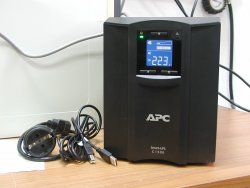I see this as an irrelevant question - like, "Why do you need insurance?" or "Why do you need a spare tire in your car?" Or even taking it further and to a more applicable "
full time" analogy, "Why do you need good tires are on your car?"
Sadly, some people are under the
false impression that if their region has a good, stable, power grid, or if their region does not suffer from severe weather then you don't need a "good" UPS with AVR for your computer and network gear. And worse, those same people then advise others they don't need a UPS.

Or they go anecdotal and claim because they have gone years without a UPS and never had a problem, then that proves they are not needed.

Wrong, wrong, wrong and wrong.
Every computer should be on a good UPS with AVR. Why? As I said above, power during a total power outage is just the icing on the cake. A minor bonus feature! The "
full time" automatic voltage regulation (AVR) for
both high
and low voltage anomalies is why a "good" UPS with AVR is so essential.
First, even in regions with the calmest weather and most stable power grid, damaging surges and spikes can come off the grid due to equipment failure or lightning strikes. No place on Earth is immune from lightning. It may be rare in some regions, but it still happens.
Second, it is wrong to assume disruptive or worse, destructive power anomalies only originate from the power grid. Any major appliance in your home can produce destructive anomalies. Refrigerators, water coolers, microwave ovens, toasters all send surges, spikes, dips and sags EVERY TIME they cycle on and off. And that's when they are working properly! Should they fail, and all electronics will - eventually, they could dump very destructive anomalies on to the circuit.
While advanced, more expensive high-wattage appliances may
attempt to suppress dumping such anomalies on the circuit –
"IF" they are not damaged and are working properly, low-tech cheap appliances will not. A cheap, $15, 1500W hair dryer made in some obscure factory in the backwoods of China, using parts from a similar factory upriver, comes to mind.
So one might say, "get a good surge and spike protector." Not good enough!
A surge and spike protector is little more than a fancy and expensive extension cord. It is a "passive" device that does absolutely nothing and is totally useless for abnormal low voltage events like dips (opposite of spikes), sags (opposite of surges), or long duration sags (brownouts) - any of which can cause your electronics to suddenly stop, resulting in possible data corruption.
For abnormal high voltage events, a surge and spike protector merely chops off ("clamps") the "transient" peaks of the sine waves, leaving a not-so pretty or clean voltage waveform for your power supplies to compensate for. For excessively high surges and spikes,
"IF" lucky

, it will trip an internal breaker and kill power - but that, of course, does nothing to protect your data from corruption.
And because destructive surges and spikes can originate from inside your home, and because surge and spike protectors do nothing for dips, sags, and brown outs, "whole-house" surge protection is not good enough either!
A "good" UPS with AVR in an "active" "intelligent" device that shapes (regulates) the sine wave into something more easily used by the devices plugged into it. In low voltage events, it will boost the voltage to normal output, employing the batteries if necessary. In extreme high voltage events, it will use the batteries to absorb the excess voltage (which batteries can do with ease), and/or dump the excess voltage to ground (Earth).






 , it will trip an internal breaker and kill power - but that, of course, does nothing to protect your data from corruption.
, it will trip an internal breaker and kill power - but that, of course, does nothing to protect your data from corruption.

